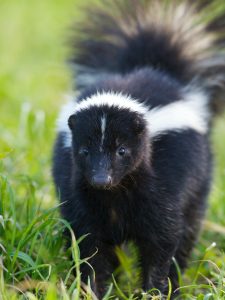Did you ever wonder what skunks like to eat? Then this article is for you! Skunks are four-legged, furry animals with a characteristic snout. They have pointed ears and a bushy tail that they use to mark their territory. They are predators, and even though even the biggest skunks only reach the size of a medium housecat, they are pretty successful at hunting for their food!
Skunk characteristics
They are famous for the nasty-smelling liquid they spray from their anal glands; their stink is known to chase away their enemies and humans alike, making them quite the opponent in any showdown. Their fur is usually black and white, but there are also skunk varieties with a grey or cream-colored coat. All skunks have a distinctive bushy tail that becomes erect and very bushy before spraying their typical scent. This scent is also used to mark their territories. Skunks themselves have a strong sense of smell. This, and their brilliant eyesight and hearing, help them find food.
Skunk diet
Skunks are usually active at dawn or nighttime, which is also the time when they go hunting for food. They are omnivores, which means that they consume both vegetation and animal flesh. Not being the pickiest of eaters, these mammals eat various plants, animals, and insects like worms and larvae. They love eating rodents, lizards, salamanders, frogs, snakes, birds, moles, and many types of eggs. They also commonly eat berries, roots, leaves, grass, mushrooms, and nuts if they can find them.
Skunks typically live in wooded areas but can also be found in urban areas. Skunks can eat pretty much any food they encounter in their habitats. It also depends on the time of year and what food is available to them.
Skunk life cycle
Skunks are solitary creatures and only come together to mate. Baby skunks, called kits, are born in the springtime. Skunks have a lifespan of 2-5 years in the wild and up to 10 years in captivity. Even though their spraying makes them unpopular, skunks are very interesting creatures that are important to the ecosystem.
The importance of what skunks eat
As a matter of fact, they contribute to a healthy ecosystem in many ways! For example, do they play an essential role in the food web and help control the populations of smaller animals. They are also known to eat harmful insects, such as ticks and beetles. Skunks provide many benefits to humans and the environment as a whole. So the next time you see a skunk, take a moment to appreciate these amazing creatures!
If you want to learn even more about skunks, check out our previous post about skunk facts here. Thank you so much for reading!






